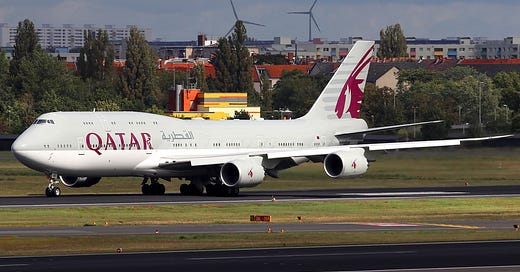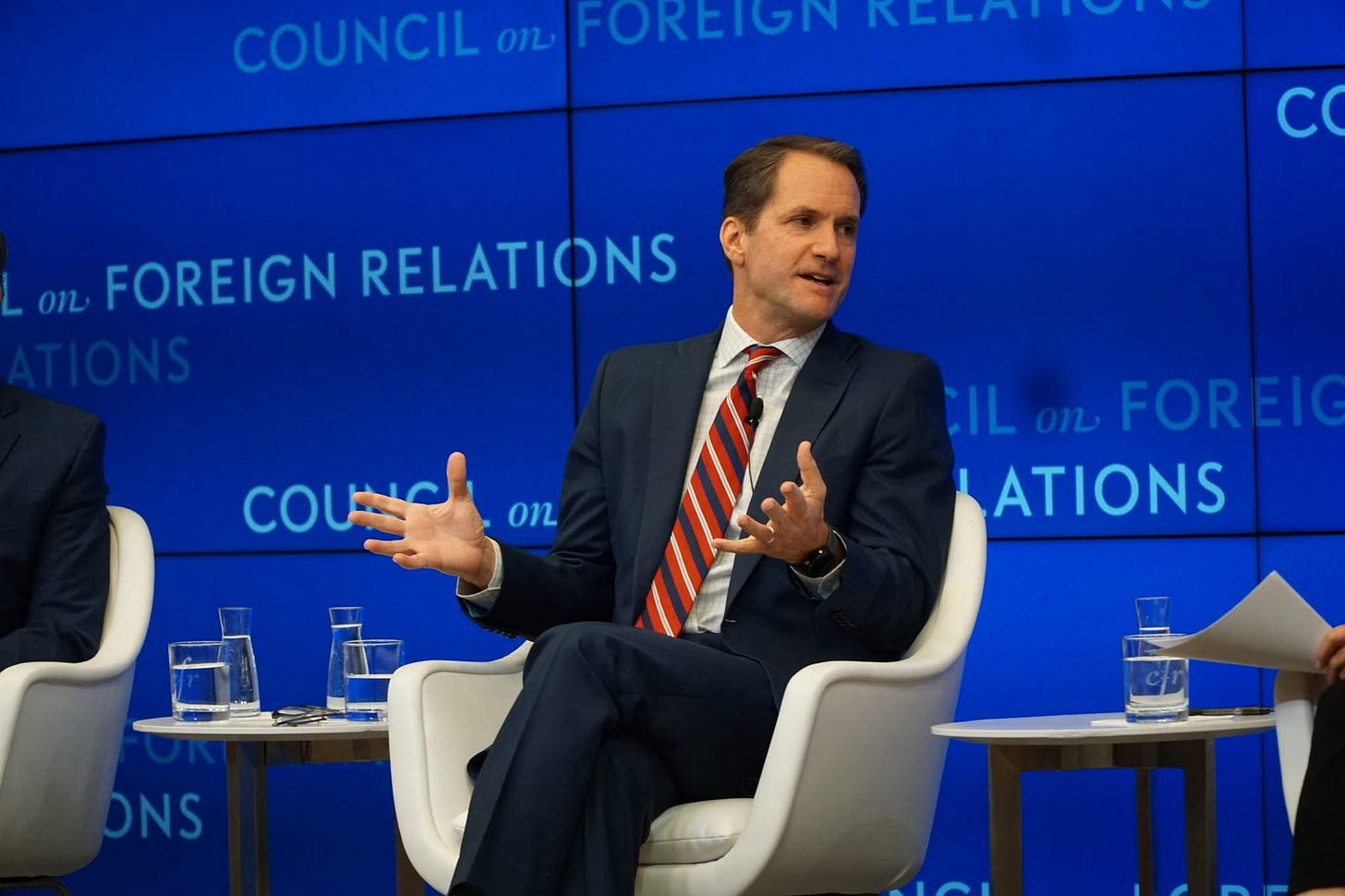Top House Intel Dem predicts Qatari plane gift to Trump is “not gonna fly”
Rep. James Himes tells SpyTalk that the cost of de-bugging the 747 alone will be enough to stop the transfer.
A key House Democrat, voicing mounting frustrations within the U.S. intelligence community, decried President Trump’s plans to accept a $400 million jumbo jet from Qatar as a potential counter-intelligence nightmare and warned that the recent firing of two top officials was tantamount to “cutting the heart” out of professional officers and analysts.
“Without any hesitation from a counterintelligence standpoint, from a strategic standpoint, this is a terrible, terrible idea, right?” said Rep. James Himes, the ranking member of the House Intelligence Committee, on the SpyTalk podcast about Trump’s intention to accept the Boeing 747-8 double-decker luxury plane as a gift from the Qatari royal family. “I mean, Americans need to remember that this isn't just an Uber for the president, right?” Any of the president’s major aircraft have to be able function as a secure command center.
Trump’s interest in the Qatari airplane gift has raised a host of ethical issues, mainly because the aircraft — after serving as part of the Air Force One fleet—would then be transferred to the Donald J. Trump Foundation after he leaves office, presumably for a museum to be built adjacent to a still unplanned presidential library. For starters, the U.S. Constitution forbids federal officials from accepting any gift, also known as an “emolument,” from “any King, Prince or foreign state” without the approval of Congress.
But Himes is one of a number of lawmakers on both sides of the aisle who have zeroed in on what they see as an even bigger red flag: the potential that the airplane will come with concealed bugs, planted by any number of foreign “friends,” adversaries or terrorist groups, who could eavesdrop on the president’s communications while he is onboard. The only way to prevent that, Himes said, would be to completely disassemble the plane piece by piece to search for surveillance devices, a monumental undertaking that could take years and add untold tens of millions to the costs, turning the plane into a “flying white elephant.”
“Without any hesitation from a counterintelligence standpoint, from a strategic standpoint, this is a terrible, terrible idea, right?”
Himes noted that, a few years ago, while on a visit to Pakistan, he was given a blue and white vase by the ISI, that country’s notorious intelligence service—a gift that he had to send to a laboratory for months to determine that it wasn't bugged. Those concerns are exponentially greater for a jumbo aircraft that must serve as a nuclear-hardened flying command post for the president at all times.
“So this is no hit on the Qataris,” Himes said, but “we would have to take apart that plane, you know, nail by nail, screw by screw and put it back together.” For this reason alone, he predicted, the plane deal will never happen. “No pun intended, but once the security people really start thinking about it, it’s not gonna fly.”
Himes, a former Rhodes Scholar and Goldman Sachs banker, is a nine-term congressman from central Connecticut who has emerged as a leading voice on intelligence issues and one who, in contrast to many of his Democratic colleagues, is also willing to work with Republicans. (He was only one of ten House Democrats who in March voted to censure one of their fellow Democrats, colleagues, Rep. Al Green of Texas, for heckling President Trump during his State of the Union speech.)
But HImes in recent months has also been infuriated by what he sees as the Trump administration’s rampant politicization of intelligence, a concern that was powerfully reinforced this week after Director of National Intelligence Tulsi Gabbard fired the two top officials on the National Intelligence Council. The dismissals of Michael Collins, the acting chair of the council, and his deputy, Maria Langan-Riekhof, came just a few weeks after the council released a report contradicting the administration’s claims that the Venezuelan government of Nicolas Maduro was directing “an invasion” of the U.S. by the Tren de Aragua criminal gang—a position the president has taken to justify its use of wartime powers under the 1798 Alien Enemies Act to deport alleged members of the Venezuelan gang without affording them due process guaranteed by the Constitution
“If the intelligence community believes that they can be fired for doing their job, two terrible things are going to happen,” Himes said. “Number one, a lot of them are going to leave. We're already seeing that. And these are not easily replaceable people, right? These are people who have devoted a lifetime to studying Chinese, to learning Farsi, to understanding satellite trajectories. They're going to leave. And number two, worse yet, they won't leave and they will accommodate [the Trump administration.
Gabbard’s office has denied that Collins and Langan-Riekhof were fired because of the intelligence council’s report on Tren de Aragua, insisting they were dismissed instead for unspecified reasons of “political bias” and that they were “radically opposed to Trump.” That prompted Himes to fire off a letter to Gabbard this week calling the charges “exceptionally serious” and demanding she provide evidence of the allegations to the intelligence committee by the end of next week.
“If you're the director of national intelligence and you've accused somebody as Tulsi did with respect to these two people, of politicizing intelligence, you’re basically cutting the heart out of professional intelligence officers.
More broadly, said Himes, this is all reminiscent of the distortions of intelligence about Iraqi weapons of mass destruction and alleged ties to Al Qaeda that were used by the Bush administration to justify the 2003 invasion of Iraq.
“You know, what was the harvest of that sowing-of-seeds?” said Himes on the podcast. “The harvest was a catastrophic war fought on false pretenses that resulted in thousands of American deaths and tens, if not hundreds, of thousands of Iraqi deaths, right?
“So I mean, this is not a trifling thing. It may be inconvenient to have the intelligence community tell you things that you don't want to hear, but basic functionality requires that you have them be objective. I sort of can't imagine being an executive and telling all of my people to give me bad information. How is that a sustainable thing? And when you're talking about the presidency of the United States and the leadership of this country, it's not just your ego, it's not just what people think. It’s young men and women in the military who are at stake.”
All of which raises the question as to whether the Congress, still firmly under Republican control, will dare to conduct oversight hearings about the firings or other changes the administration is making on intelligence issues. (Late this week, the New York Times reported that Gabbard was reorganizing the teams that provide the president with his daily intelligence briefing, moving them from the CIA to her ODNI office, thereby giving her tighter control over the final product.) Himes said he has a good relationship with Rep. Rick Crawford, the Republican chairman of the committee (who happens to be a former Army bomb disposal technician) But he is anything but optimistic that Crawford or others in the GOP leadership will dare investigate the inner workings of the Trump administration.
“You know, the Congress remains a wholly owned subsidiary of Donald Trump—Donald J. Trump Inc.,” said HImes. “And while I see some cracks in the foundation, that's what it is.”







The first thing I said about the gift is that it is going to be full of bugs. Not only that, but I then read that the plane is being offloaded on Trump because they have not been able to sell the gaudy thing.
The destruction is so rapid, that it makes one's head spin.
Is anyone surprised?